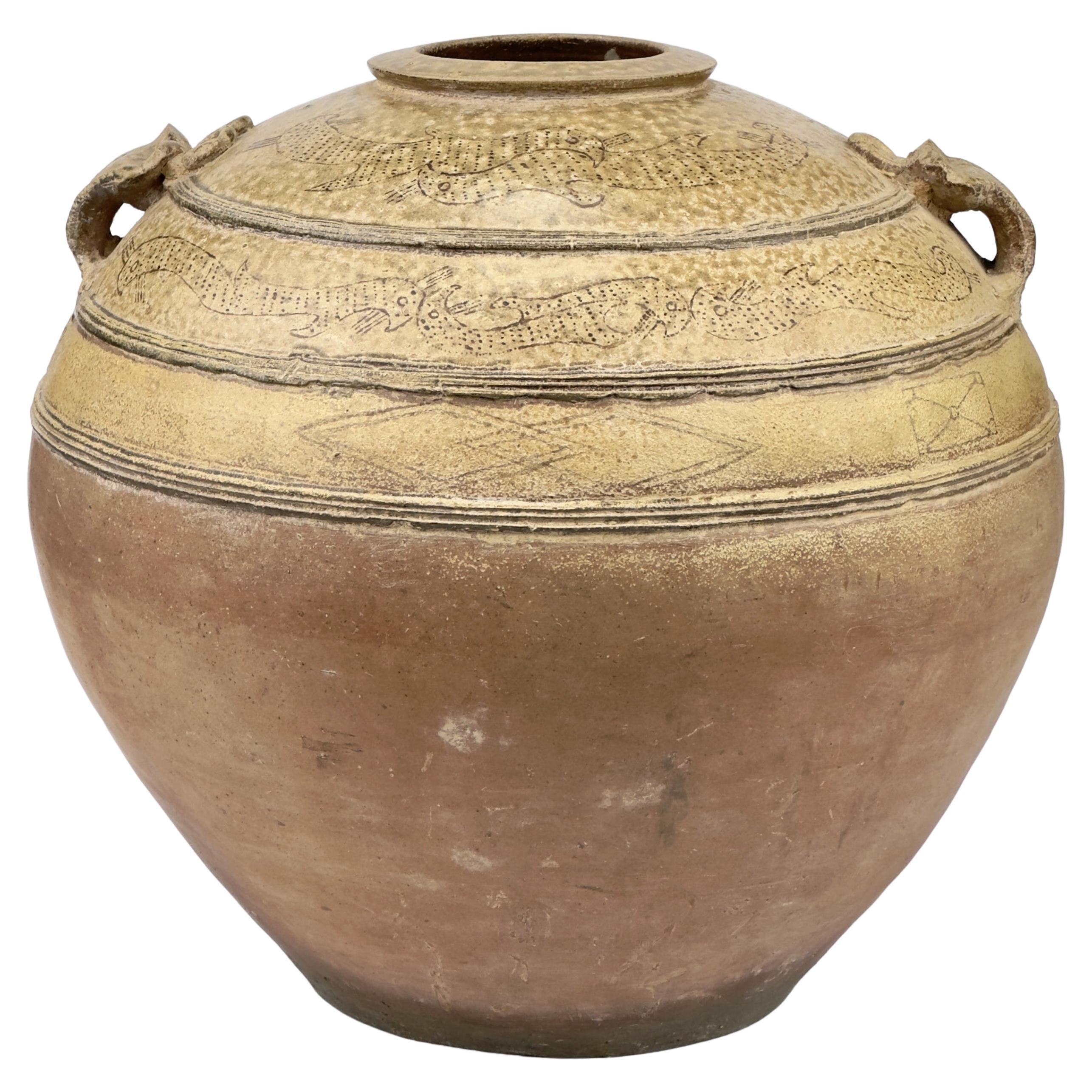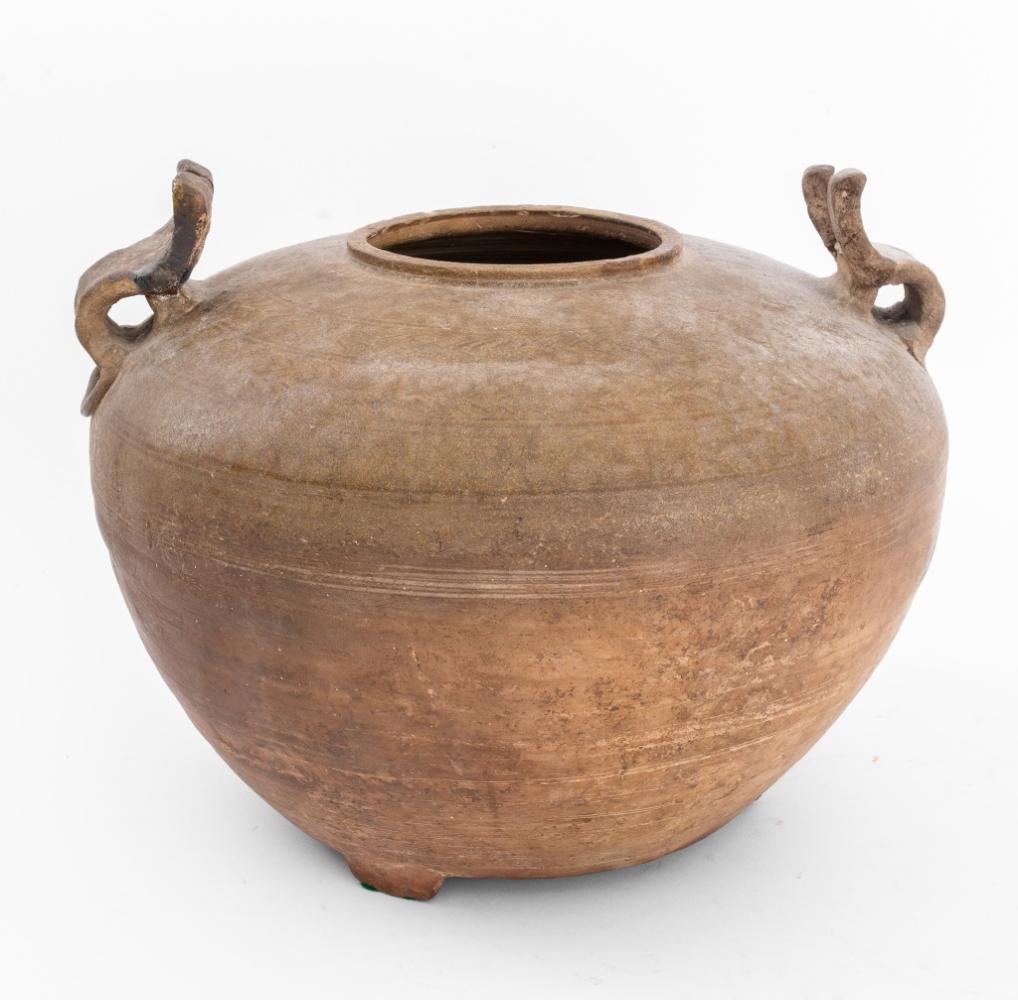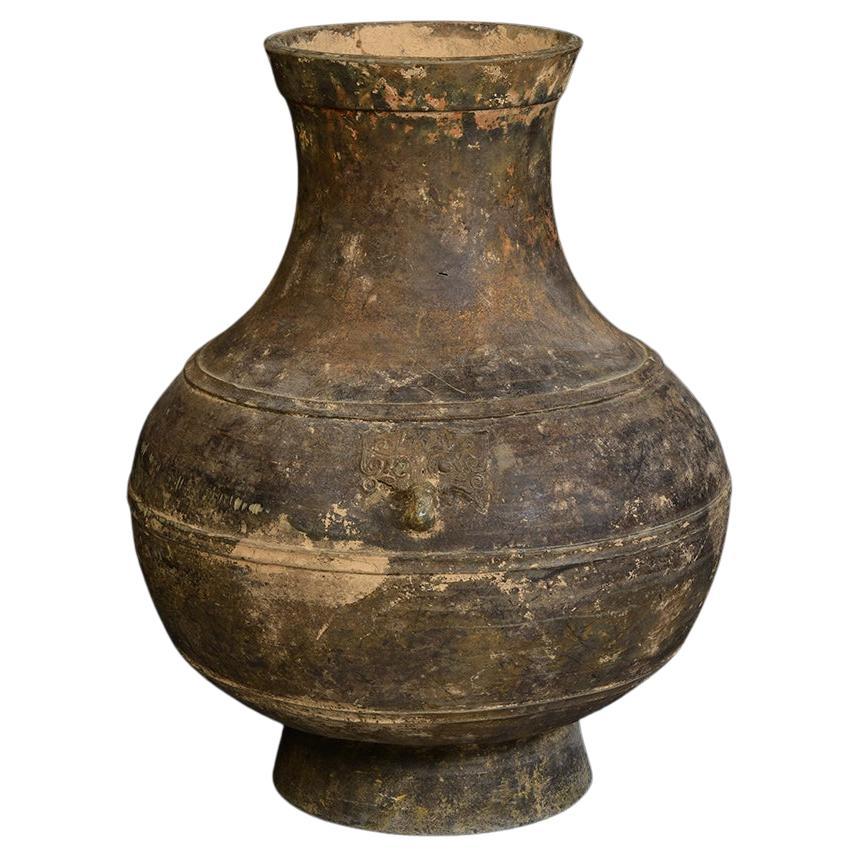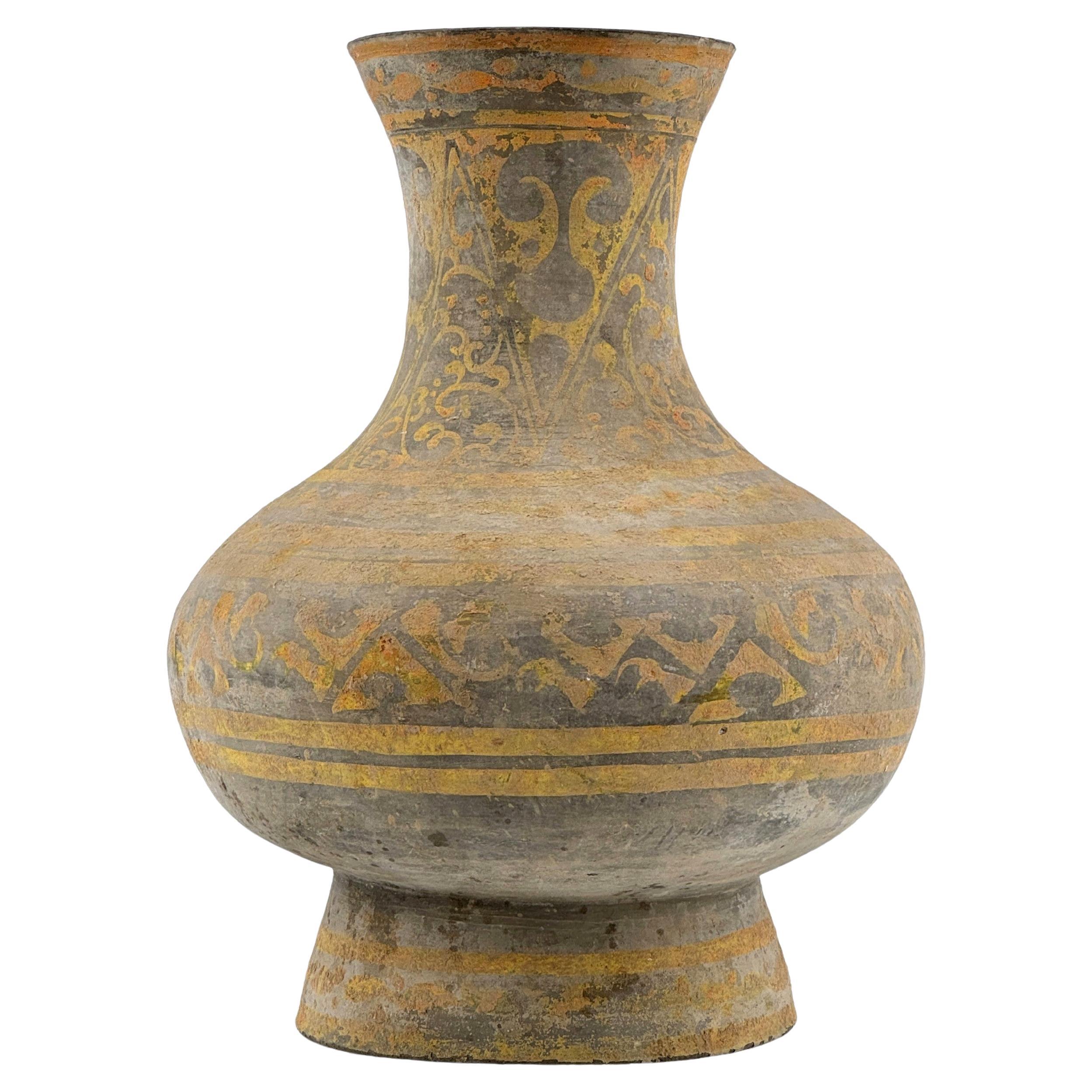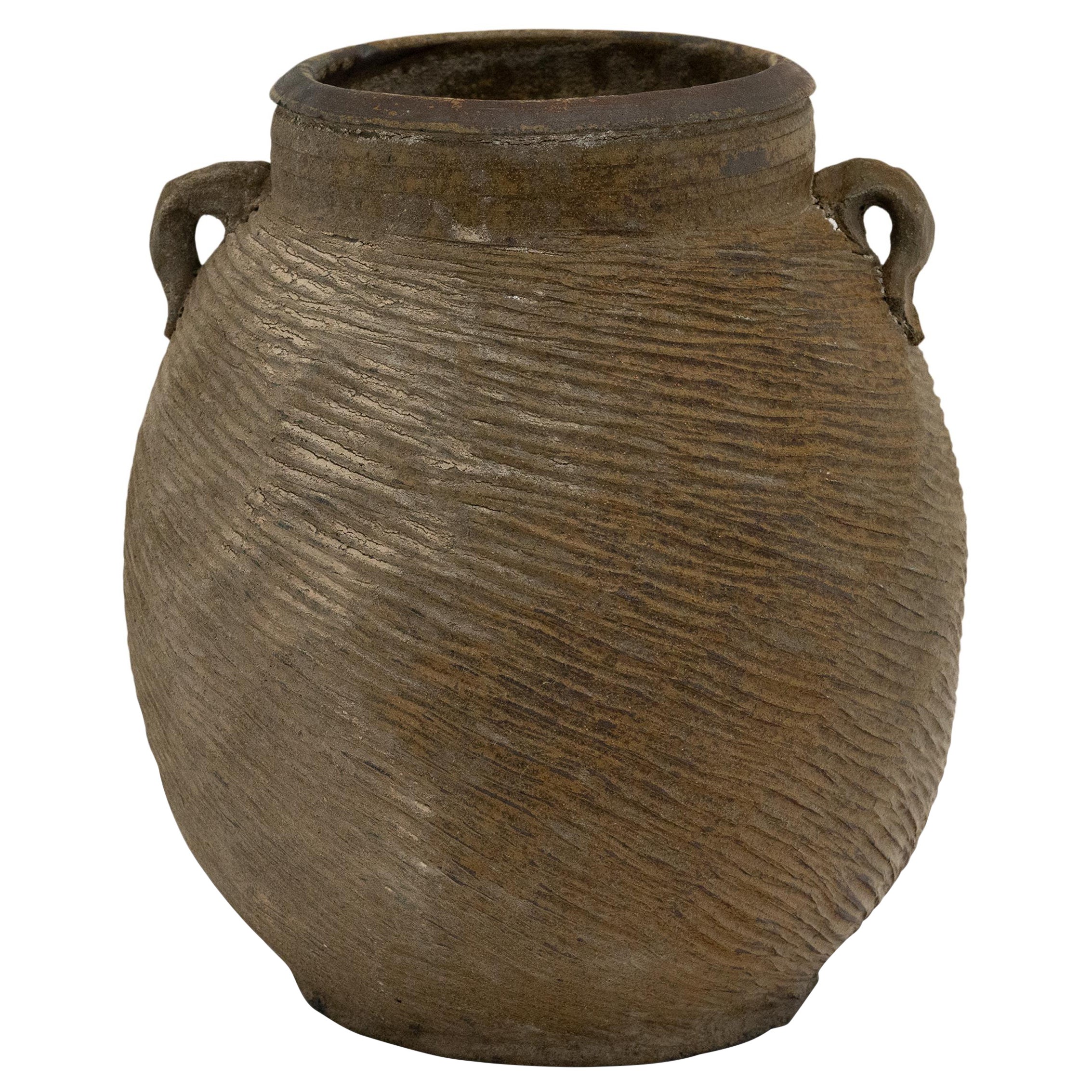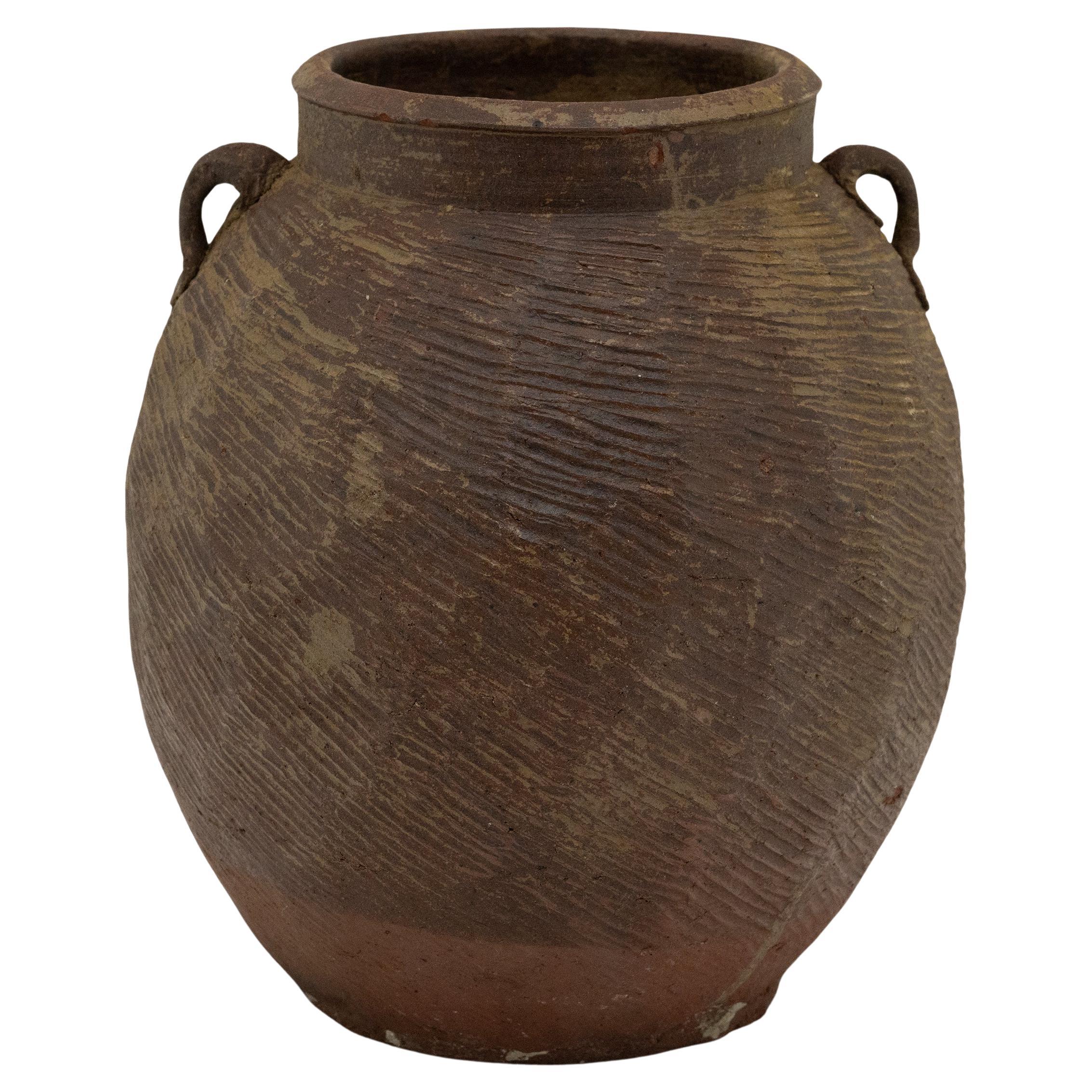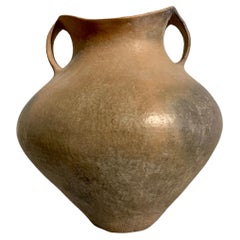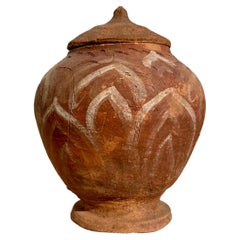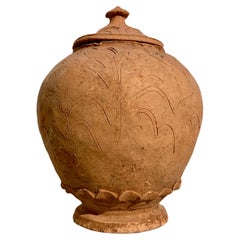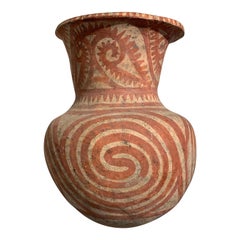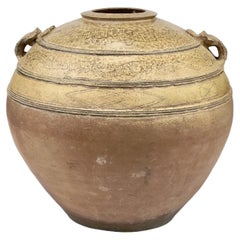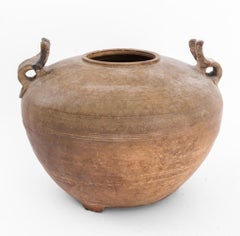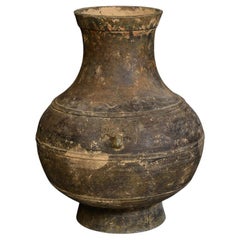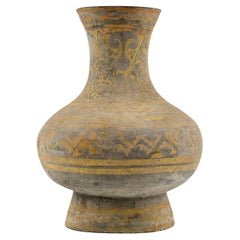Items Similar to Massive Chinese Eastern Han Dynasty Impressed Pottery Jar '25-220 AD'
Want more images or videos?
Request additional images or videos from the seller
1 of 9
Massive Chinese Eastern Han Dynasty Impressed Pottery Jar '25-220 AD'
$28,000
£21,245.76
€24,292.62
CA$39,108.41
A$43,483.23
CHF 22,704.54
MX$529,296.77
NOK 289,700.07
SEK 271,435.13
DKK 181,300.31
Shipping
Retrieving quote...The 1stDibs Promise:
Authenticity Guarantee,
Money-Back Guarantee,
24-Hour Cancellation
About the Item
A stunning and massive Chinese high fired gray pottery jar of remarkable size and girth, with impressed geometric design, Eastern Han Dynasty (25-220 AD), Zhejiang Province, China.
The coil-formed massive high fired gray pottery storage jar of elegant proportions, with a wide mouth with an out-turned lip and even wider shoulders, tapering downwards to a slightly concave foot. The voluptuous body decorated simply with a repeating geometric design. The high fired gray pottery body visible under and encrustation of the red soil Zhejiang is famous for.
The deeply impressed design covers most of the body, starting just under the shoulders, and stopping well above the foot. The design was created using a carved stamp or paddle to impress the design into the gray pottery body while it was still wet.
TL tested by Oxford Authentication.
- Dimensions:Height: 17.5 in (44.45 cm)Diameter: 25 in (63.5 cm)
- Style:Han (Of the Period)
- Materials and Techniques:Pottery,Fired
- Place of Origin:
- Period:
- Date of Manufacture:20-220 AD
- Condition:Repaired: Repairs and restorations as expected. Wear consistent with age and use. With repairs and restorations as expected. A hole just above the foot, possibly for drainage.
- Seller Location:Austin, TX
- Reference Number:1stDibs: LU894716273021
About the Seller
5.0
Platinum Seller
Premium sellers with a 4.7+ rating and 24-hour response times
Established in 2001
1stDibs seller since 2010
345 sales on 1stDibs
Typical response time: <1 hour
- ShippingRetrieving quote...Shipping from: Austin, TX
- Return Policy
Authenticity Guarantee
In the unlikely event there’s an issue with an item’s authenticity, contact us within 1 year for a full refund. DetailsMoney-Back Guarantee
If your item is not as described, is damaged in transit, or does not arrive, contact us within 7 days for a full refund. Details24-Hour Cancellation
You have a 24-hour grace period in which to reconsider your purchase, with no questions asked.Vetted Professional Sellers
Our world-class sellers must adhere to strict standards for service and quality, maintaining the integrity of our listings.Price-Match Guarantee
If you find that a seller listed the same item for a lower price elsewhere, we’ll match it.Trusted Global Delivery
Our best-in-class carrier network provides specialized shipping options worldwide, including custom delivery.More From This Seller
View AllChinese Siwa Culture Burnished Pottery Jar, 1500 - 1100 BC, China
Located in Austin, TX
A striking Chinese Neolithic to Bronze Age burnished red pottery double handled saddle mouth storage jar, Siwa Culture (circa 1500 to 1100 BC), modern day Gansu Province, China.
...
Category
Antique 15th Century and Earlier Chinese Ceramics
Materials
Pottery
Chinese Red Pottery Lotus Jar, Five Dynasties, 10th Century, China
Located in Austin, TX
A boldly painted Chinese pottery "lotus jar" with incised decoration, Five Dynasties and Ten Kingdoms, Dali Kingdom, 10th century, Yunnan, China.
The ele...
Category
Antique 15th Century and Earlier Chinese Antiquities
Materials
Pottery
Chinese Pottery Lotus Jar, Five Dynasties, 10th century, China
Located in Austin, TX
A stately Chinese molded, carved, and painted "lotus jar", Five Dynasties and Ten Kingdoms (907 - 979 AD), Dali Kingdom, China.
The elegant vessel of fir...
Category
Antique 15th Century and Earlier Chinese Antiquities
Materials
Pottery
Large Thai Ban Chiang Painted Pottery Vessel, Late Period, circa 300 BC
Located in Austin, TX
A massive Ban Chiang culture painted pottery vessel, circa 300 BC, Thailand.
The large storage jar painted with a bold spiral pattern in red ochre on a b...
Category
Antique 15th Century and Earlier Thai Jars
Materials
Pottery
Chinese Yueyao Celadon Glazed Jar 'Guan', Five Dynasties, 10th Century
Located in Austin, TX
A sublime Chinese Yueyao glazed guan jar with incised decoration and applied handles, five dynasties period (907- 979 AD), China.
The vessel of somewhat flattened globular form, w...
Category
Antique 15th Century and Earlier Chinese Tang Ceramics
Materials
Stoneware
Chinese Neolithic Qijia Culture Red Pottery Vessel, 2200 BC - 1600 BC, China
Located in Austin, TX
An attractive Neolithic Chinese burnished red pottery vessel, Qijia Culture (2200 BC - 1600 BC), modern day Gansu Province, China.
The vessel of compressed globular form set on a short, pieced pedestal foot, and featuring two ear handles, a short, wide neck, and slightly everted mouth. A simple incised band decorates the otherwise plain body.
The red pottery with a beautiful rich terracotta hue. The slight burnishing makes the vessel glow.
The Qijia Culture was a late Neolithic...
Category
Antique 15th Century and Earlier Chinese Ceramics
Materials
Pottery
You May Also Like
Large Yue Globular Stoneware Jar, Han Dynasty-Three Kingdoms
Located in seoul, KR
Robustly crafted with a voluminous spherical body and a layered mouth rim, this jar features a pair of taotie handles. It is adorned with three horizontal bands on the upper half of ...
Category
Antique 15th Century and Earlier Hong Kong Han Antiquities
Materials
Stoneware
$2,793 Sale Price
30% Off
Chinese Han Dynasty Stoneware Storage Vessel
Located in Astoria, NY
Chinese Han Dynasty Stoneware Storage Vessel, with two applied animal form handles. 10" H x 12.5" Diameter. Provenance: From the Upper East Side Apartment of a Former Ambassador.
Category
Antique 15th Century and Earlier Ceramics
Materials
Stoneware
Han Dynasty, Antique Chinese Pottery Hu Jar
Located in Sampantawong, TH
Chinese pottery Hu jar decorated with bands of raised lines and a pair of monster masks on the shoulder.
Age: China, Han Dynasty, 206 B.C. - A.D.220
Size: h...
Category
Antique 15th Century and Earlier Chinese Antiquities
Materials
Pottery
$2,800 Sale Price
20% Off
Earthenware Pottery Jar, Han Dynasty(206 BC-220 AD)
Located in seoul, KR
This jar would have served as a mortuary object (mingqi), placed in a tomb as a substitute for the more valuable bronze and lacquer vessels. Along with a variety of other funerary earthenware objects, attendant figures, and animals, richly decorated vessels of this kind were intended to serve the spirit of the deceased in the afterlife.
Period : Han dynasty
Type : Jar
Medium : Earthenware
Dimension : 28.5 cm(Height) x 11cm(Mouth Diameter)
Condition : Good(Overall in well-preserved ancient burial condition with some soil still adhering (showing minor abrasions and wear due to prolonged burial underground)
Provenance : Acquired in late 1990s from Hongkong
* Han Dynasty Earthenware...
Category
Antique 15th Century and Earlier Hong Kong Han Antiquities
Materials
Earthenware
$2,093 Sale Price
30% Off
Chinese Yunnan Lobed Pot, c. 1800
Located in Chicago, IL
Charged with the humble task of storing dry goods, this small terracotta pot was hand-shaped in the 19th century with balanced proportions and a ...
Category
Antique Early 19th Century Chinese Qing Vases
Materials
Terracotta
Chinese Yunnan Lobed Pot, c. 1800
Located in Chicago, IL
Cloaked in a beautifully irregular brown-green slip finish, this 19th-century earthenware pot was charged with the humble task of storing dry goods in a Qing dynasty kitchen. The lob...
Category
Antique Early 19th Century Chinese Qing Vases
Materials
Terracotta
More Ways To Browse
Gray Pottery
Chinese Art Pottery
Chinese Brown Pottery
Han Dynasty
Antique Chinese Stamps
Antique Pottery Stamps
Red Chinese Pottery
Antique Han Dynasty
Antique Storage Jars
Pottery China Han
Han Dynasty Pottery
Chinese Red Jars
Antique Paddle
Chinese Storage Jar
Tl Tested
Chinese Han Dynasty Jar
Rare Antiquities
Han Dynasty
